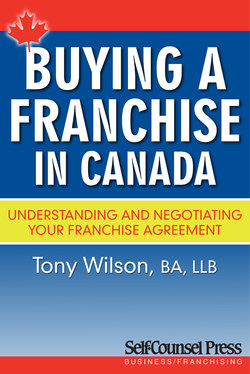Читать книгу Buying a Franchise in Canada - Tony Wilson - Страница 12
На сайте Литреса книга снята с продажи.
6. Has the US Agreement been Converted to a Canadian Agreement?
ОглавлениеBe mindful of US agreements that have not been Canadianized. A US agreement is relatively easy to spot and not just by the spelling of colour, labour, centre, and neighbour! A US agreement may contain references to the Lanham Act rather than our Canadian Trade-Marks Act or it may refer to Chapter 11 instead of our Bankruptcy and Insolvency Act.
The US agreement might have “offering circular” provisions in the agreement that don’t directly relate to Alberta or Ontario. It may contain terms such as FTC or FDD, which mean little or nothing to us in Canada. You probably won’t find a reference to GST or PST either. Measurements might not be expressed metrically. Bilingual packaging and labelling may be totally ignored as well.
The fact that products and equipment may have to be imported from the US into Canada may not have been considered in anyone’s pro forma financials, putting the Canadian franchisee at a competitive disadvantage — if not abject hardship — if all the inventory has to come only from one bakery in San Francisco or one factory in Boston. The fact that products imported into Canada may have import duties attached to them, or may not in fact be importable at all, or that such products may require different packaging and labelling than required in the US may have been totally missed by our cousins south of the border (who might not expect to see French on the back of Cornflakes boxes, and all other boxes sold in this country). If that weren’t enough, the currency that you’ll be paying your royalties with will be US dollars, even though your customers will be paying you with Canadian dollars. So US franchise agreements in which the minor (but important) distinctions between our two nations are not dealt with are cause for concern, especially if you are on the receiving end of such an agreement.
The US agreement will usually choose a US state as the governing law of contact and the place in which all legal proceedings concerning the contract will be heard, rather than a nice city such as Vancouver or even a sensible place such as somewhere within the province in which the franchised business just happens to operate.
In very extreme cases, the franchisor’s US lawyers will somehow have forgotten about the border between Canada and the US and will require Canadian-based franchisees and their principals to comply with all sorts of inapplicable US laws including, of all things, the Patriot Act! (Don’t laugh; I’ve seen it done!) Try to avoid entering a contract in which Canadian law and Canadian concepts have not been dealt with. It simply means the franchisor’s lawyers failed both history and geography, and suggests that the franchisor doesn’t really want to spend the money to convert its US agreement into a Canadian one. If they aren’t prepared to spend the money to convert their US agreement to a Canadian one, how do you think they’ll be dealing with their Canadian franchisees?
It’s possible that a US-based franchisor may not vet its standard US franchise agreement with Canadian counsel before it starts granting franchises in Canada. If the agreement is governed by US law, you may well be bound by some or all of these US laws. If the agreement is governed by the laws of the jurisdiction in which the franchised business is located (e.g., BC), then perhaps the franchisor would have some enforceability problems down the road, as the US concepts that supposedly apply to the agreement have limited or no applicability in Canada. (At the very least, it will make lawyers that deal with conflicts of law happy, content, and wealthy!)
There also seems to be a different style and tone in the usual Canadian form of franchise agreement (when compared to the style and tone of the usual US agreement). Some US-based franchisors have been more than surprised when they have discovered that the ironclad, tough, and controlling form of agreement filled to the gunwales with legal provisions that overprotect the franchisor is regularly and resoundingly rejected in the Canadian franchisee marketplace, as too ironclad, tough, controlling, and filled to the gunwales with too many provisions that overprotect the franchisor. Canadians are, after all, the only people in the world that say thank you to bank machines; you’d expect our franchise agreements would be polite as well.
What seems to be forgotten in all this is that some of the same legal specialists who might review the US agreement on behalf of the Canadian franchisee may well be the same people who write these agreements on behalf of the Canadian franchisor. (It’s a small fraternity after all! In Canada, no more than 50 Canadian lawyers specialize in franchise law at the time of writing this book.)
If you have retained a lawyer with some familiarity with franchising (and my advice is that you should), he or she will know what is normal for the Canadian marketplace. Your franchise lawyer will advise you about what is not normal, what is over-the-top, what is overreaching, and what is just plain wacky (see references to the Patriot Act, above). It may well be that your franchise lawyer may tell you, “This agreement is way out of line and nobody in their right mind should sign it.”
In short, if the American franchisor hasn’t Canadianized its US form of agreement, you should ask the very sensible question: Why?
